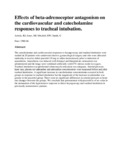| dc.contributor.author | Achola, KJ | |
| dc.contributor.author | Jones, MJ | |
| dc.contributor.author | Mitchell, RW | |
| dc.contributor.author | Smith, G | |
| dc.date.accessioned | 2013-06-12T07:40:00Z | |
| dc.date.available | 2013-06-12T07:40:00Z | |
| dc.date.issued | 1988-06 | |
| dc.identifier.citation | Anaesthesia. 1988 Jun;43(6):433-6. | en |
| dc.identifier.uri | http://www.ncbi.nlm.nih.gov/pubmed/3407865 | |
| dc.identifier.uri | http://erepository.uonbi.ac.ke:8080/xmlui/handle/123456789/32010 | |
| dc.description.abstract | The catecholamine and cardiovascular responses to laryngoscopy and tracheal intubation were studied in 20 patients who underwent elective gynaecological surgery and who were allocated randomly to receive either practolol 10 mg or saline intravenously prior to induction of anaesthesia. Anaesthesia was induced with fentanyl and thiopentone; atracurium was administered and the lungs were ventilated artificially with 67% nitrous oxide in oxygen. Tracheal intubation was performed when muscle relaxation was adequate. Arterial pressure, heart rate, plasma noradrenaline and adrenaline concentrations were measured before and after tracheal intubation. A significant increase in catecholamine concentrations occurred in both groups in response to tracheal intubation but the magnitude of the increase in adrenaline was greater in the practolol group. There were no significant differences in arterial pressure or heart rate changes between the groups. We conclude that pretreatment with practolol is of no value in the attenuation of the hypertensive response to direct laryngoscopy and tracheal intubation in previously normotensive patients. | en |
| dc.language.iso | en | en |
| dc.publisher | University of Nairobi, | en |
| dc.title | Effects of beta-adrenoceptor antagonism on the cardiovascular and catecholamine responses to tracheal intubation. | en |
| dc.type | Article | en |
| local.publisher | School of Medicine, University of Nairobi | en |

